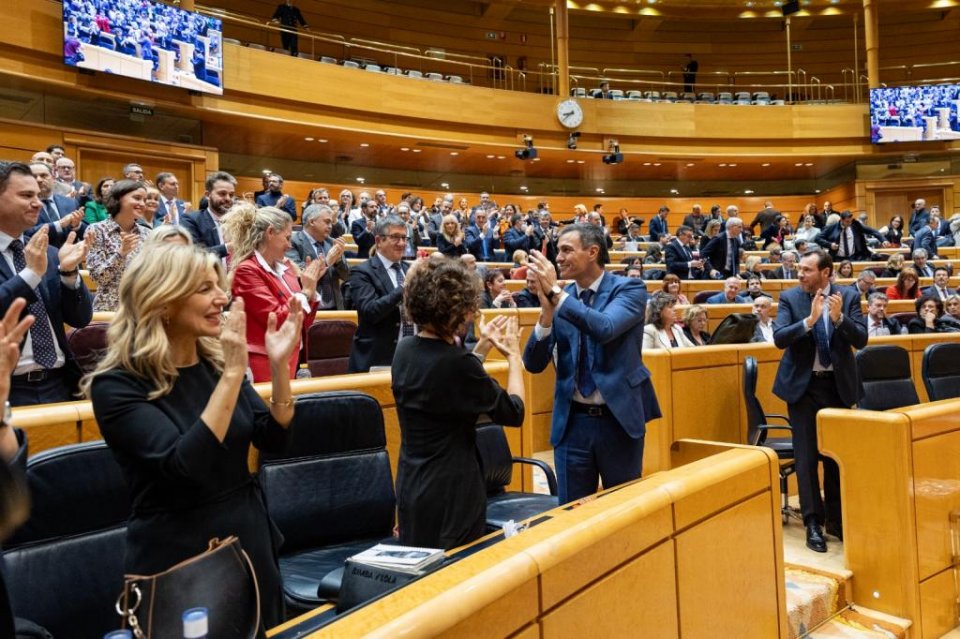Spanish Prime Minister Pedro Sánchez on Wednesday suffered a setback in the first key parliamentary vote of the new legislature, exposing the fragility of his ruling coalition that has just started its second term. He needs the support of several small parties, including the pro-independence and nationalist groups of Catalonia and the Basque Country, to pass legislation. ALSO READ: Pedro Sánchez faces backlash and tough legislature ahead due to Catalan deal.
In a closely fought vote on three government decrees, MPs passed two of them by the narrowest of margins (172 to 171). The vote was held in the Senate house as the Spanish Congress is currently undergoing refurbishment.
During their first plenary session of the year, MPs were asked to vote on three decrees adopted in late December by Spain’s left-wing government which needed to secure parliamentary approval within a month.
The first one that passed concerned the functioning of the justice system and Spain’s public administration — measures demanded by Brussels to unblock €10 billion of European funding.
A second decree on unemployment benefits was rejected after five MPs from the left-wing Podemos voted against.
MPs were initially deadlocked on the third and most important decree, on extending measures to help households cope with rising inflation by curbing food and public transport costs. ALSO READ: Spain extends some anti-inflation measures, including public transport subsidies, in 2024.
But in a repeat vote several hours later, the measure passed by 172 votes in favour to 171 against.
The socialist (PSOE) prime minister faced an uphill battle after the seven Catalan pro-independence MPs of Junts per Catalunya (JxCat) and five more from Podemos pledged to oppose the measures.
‘There can be no reason, no political outlook nor ideology that can justify not supporting our citizens, our families and our factories,’ said PSOE cabinet minister Félix Bolaños as the debate opened.
Sánchez returned to power in November for a four-year term after finally managing to put together a working coalition following an inconclusive general election in July that resulted in a hung parliament. ALSO READ: Pedro Sánchez re-elected as Spanish Prime Minister.
After months of negotiations, JxCat agreed last year to back Sánchez’s in exchange for a controversial amnesty law for those wanted by the justice system in connection with the failed 2017 Catalan independence bid. ALSO READ: Amnesty bill registered in Spanish Congress – full details.
Over the past few days, his minority coalition, which groups his PSOE socialists with the left-wing alliance of Sumar, had been locked in negotiations to head off defeat, notably with JxCat, whose leader Carles Puigdemont lives in exile in Belgium. ALSO READ: The PSOE and Junts sign a pact that will guarantee investiture of Pedro Sánchez.
Faced with the prospect of a humiliating setback, the government even reached out to right-wing opposition leader Alberto Núñez Feijóo, head of the People’s Party (PP) only to be rudely rebuffed.
‘The government, regardless of the final result of the vote, has made a fool of itself by bargaining with the rights of all Spaniards,’ Feijóo railed after the initial vote, accusing Sánchez of prioritising the pro-independence parties. ‘Spain doesn’t deserve this kind of disgraceful misrule … we don’t deserve politics like this, this disgrace, this humiliation.’
‘If three decrees have put the government in check, it is terrifying to think what each week of this legislature will be like,’ added Feijoo.
On Wednesday, JxCat showed just what a difficult and unpredictable ally it could be.
‘You need to accept that you don’t have a majority,’ JxCat’s Miriam Nogueras told Sánchez during the debate.
In exchange for the votes of its seven MPs, JxCat demanded the removal of part of the judicial decree which it said could jeopardise the amnesty law that is currently passing through parliament.
It also demanded the government penalise businesses which moved their headquarters out of Catalonia during the independence crisis. The government refused to do this, but instead offered incentives for businesses to return to Catalonia.
JxCat finally said it agreed a range of last-minute concessions, which allowed it to abstain in Wednesday’s votes, ensuring the approval of two of the three texts. ALSO READ: Feijóo vows to continue protests against amnesty ‘until there are new elections’.
Hoy es un gran día para la mayoría social de nuestro país.
— Pedro Sánchez (@sanchezcastejon) January 10, 2024
Hemos aprobado la revalorización de las pensiones conforme al IPC, la bonificación del transporte público, la rebaja del IVA de alimentos básicos o los descuentos en las facturas de la luz y el gas.
Lo hacemos con… pic.twitter.com/RVAYN2zgjr
Sign up for the FREE Weekly Newsletter from Spain in English.
Please support Spain in English with a donation.
Click here to get your business activity or services listed on our DIRECTORY.
Click here for further details on how to ADVERTISE with us.


